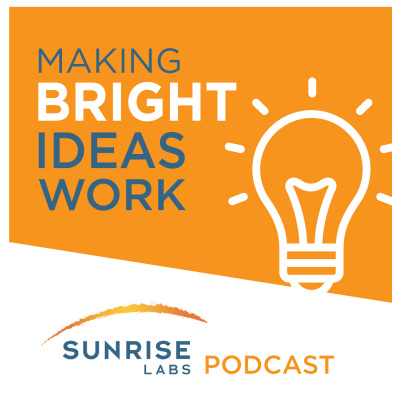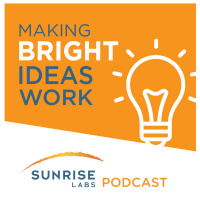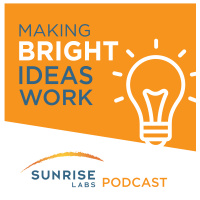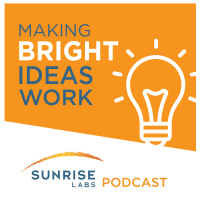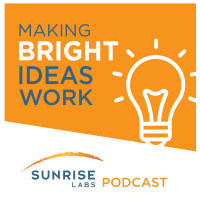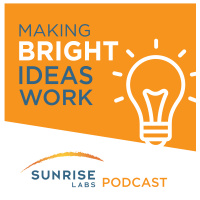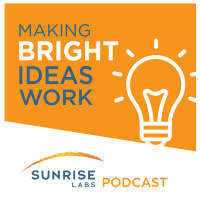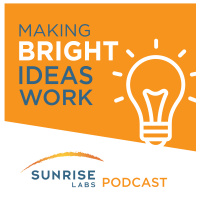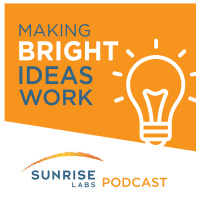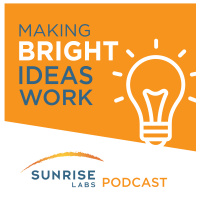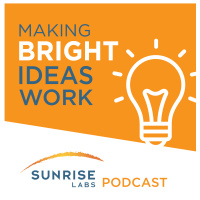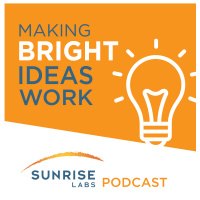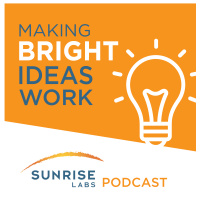Making Bright Ideas Work
- Autor: Vários
- Narrador: Vários
- Editor: Podcast
- Duración: 4:36:00
- Mas informaciones
Informações:
Sinopsis
Join Sunrise Labs on the Making Bright Ideas Work podcast to discuss the ins and outs of bringing medical devices to life, and their impact on the industry and beyond.
Episodios
-
Quality Assurance Teams and Building a Foundation of Trust
10/11/2020 Duración: 36minQuality assurance is a critical component in the product development and manufacturing process. For medical devices, it’s paramount. Sunrise Labs’ Spencer Zawasky, Principal Quality Engineer and Test Manager, and Trisha Bouthot, Director of Quality & Test, spoke about the importance of building a foundation of trust within quality assurance teams and with clients. Bouthot said there are many factors involved to build a foundation of trust within a quality assurance team. Idea and knowledge sharing are critical components in this team trust formula. “As an organization, we share a lot of knowledge. We have many lunch and learns and technical sharing sessions. And as a quality department, we meet multiple times a week and share in our experiences. There is so much power in knowledge transfer,” Bouthot said. “It really helps our team to be efficient.” Empowerment is another element Bouthot said helps build trust within a team. “Allowing people within a team to own their tasks and own their responsibilities p
-
Empathy is Key to Home Use Medical Device Success with Alex Therrien and Kelly Catale
10/08/2020 Duración: 37minThe healthcare industry has been trending toward health monitoring in the home environment, and since COVID-19, this trend has significantly increased. Medical device manufacturers are experiencing many new opportunities and additional challenges in designing medical devices for a more diverse user population and less controlled use environment. In this Sunrise Labs podcast, Alex Therrien, Director of User Centered Design and Kelly Catale, Principal Human Factors Engineer, explain how taking a User Centered Approach to designing home use medical devices will lead to a more successful medical product. Starting the medical device design process from the standpoint of empathy will ensure that the new device will fit into the end user’s life and is more likely to be adopted. User adoption and therapy adherence will determine the success of the product for all stakeholders.
-
Key Considerations in Choosing a Design Partner and Contract Manufacturer
28/04/2020 Duración: 18minOn this episode of “Making Bright Ideas Work,” Eric Soederberg, CEO at Sunrise Labs, explains that if you choose a manufacturer to design your product, you may lose the ability to take a fresh look at your design.After the design is defined is the time to select the most appropriate contract manufacturer and then you’ll have flexibility to compare the offerings from more than one contract manufacturer with a clear view of what you need.
-
Continuous Improvement and Investing in Your Company’s Future with Eric Soederberg
03/02/2020 Duración: 12minBuilding a company culture of continuous improvement and investing for the future sounds like an obvious recipe for success, but it is easier said than done. Eric Soederberg, CEO of Sunrise Labs, joined Tyler Kern on this episode of the Sunrise Podcast to talk about the importance of creating the right work environment for continuous improvement and the investments required to bring that culture to life. “Continuous improvement is an investment,” Soederberg said. “When someone comes into your office and says they have a great idea, but they need to buy something or take a particular class to make it happen, it requires you to say yes.” Soederberg’s philosophy is to foster an environment where employees are comfortable coming to managers for things they want or need. When Soederberg first came to Sunrise Labs, people were not asking for stuff, and they made do with existing equipment that was sometimes up to 20 years old. It was important for Soederberg to change the culture into one where people felt they wer
-
The Keys to Successfully Outsourcing Product Development with Laurin Noel
14/01/2020 Duración: 24minNo one is an expert at everything, which is why hiring a product development team to get your medical product off the ground can determine whether it will ultimately sink or swim. Product development team expert at Sunrise Labs, Laurin Noel, joins Making Bright Ides Work to discuss what components lead to a successful group of product developers.With over 27 years of experience in the medical product development business, Sunrise Labs has seen a thing or two. Noel cautions startups and established businesses alike on what to avoid when outsourcing product development. Her leading cautionary tale is to not drop the project on the team and walk away. Remember to dedicate time to your third-party employees, she said. Allocate extra resources and over-estimate the time it may take to fully realize the product through multiple revisions."Think of the project holistically," Noel said, "in order to use time and money efficiently."With years of experience and anecdotes, Noel educates listeners on common roadblocks in
-
Project Management is Most Successful When it's Personal with Joe McCluskey of Sunrise Labs
04/10/2019 Duración: 19minFor all the discussion about process improvement, company culture, and team member morale, you might forget that Sunrise Labs is a medical laboratories company offering a broad spectrum of clinical laboratory testing. That's because Sunrise Labs was founded to be different, and that's evident in everything they do down to the way they run their daily operations. Today on Making Bright Ideas Work, the Sunrise Podcast powered by Sunrise Labs, we sat down with Program Manager Joe McCluskey to discuss how agile project management is more than methodology -- it's about people. "Personal ownership means that you really take pride and you want to deliver the best you can," McCluskey said. "Individual contributions help the team, like the building blocks, to create a better widget when you combine all those personal ownership items." While the team at Sunrise uses agile methodology, most commonly used in software development, and a daily scrum in its everyday operations, they take a very personal approach to project
-
The Trade Group Looking Out for the MedTech Community
12/08/2019 Duración: 22minPerhaps no state is more renowned for medicine than Massachusetts. The Commonwealth is host to leading hospitals, medical centers, and medical device companies that are maturing next generation technologies. But medtech enterprises large and small need representatives to ensure that innovations in the space can thrive. That’s where Brian Johnson comes in. He is President of the Massachusetts Medical Device Industry Council (MassMEDIC) and on this week’s episode of Making Bright Ideas Work, a Sunrise Labs podcast, he shared insights into his advocacy work. “We help maintain a healthy environment for medical device innovators,” Johnson said. Medicine is a highly regulated industry so his trade group works with government partners to streamline processes and ensure a healthy ecosystem that fosters innovation. Whether its pushing for the repeal of the medical device tax or staying atop of Brexit and its complications for medical device companies, MassMEDIC is there looking out for its members and the medtech
-
Impact Medical Technology as a Software Engineer & Architect with Jim Turner & Mike Goulet
29/05/2019 Duración: 13minWith healthy growth rates projected for the medical technology and devices industry globally, MedTech careers are in high demand. On this episode of Making Bright Ideas Work, we break down how two open positions in the software and product development field at Sunrise Labs are affecting medical change on an industry level. To share their insight, host Daniel Litwin sat down with Jim Turner, director of software development, and Mike Goulet, program manager & software technical lead. “We have a lot of opportunities here at Sunrise,” Turner said. Sunrise Labs has been delivering medical device design and engineering expertise for more than 25 years. The Embedded Software Engineer is tasked with leading the company forward into new product markets, bringing deep C or C++ skills, Linux applications experience, and wireless protocol experience. Personality-wise, Sunrise is looking for someone with a strong, driving desire to bring cutting-edge products to the table, Goulet said. In addition, Sunrise is seeking
-
Company Culture Eats Strategy for Breakfast with Eric Soederberg
18/03/2019 Duración: 21minWhat are the keys to a successful business? Many will claim that businesses can stay ahead by keeping up with current trends, being innovative, and offering competitive price points, but what about other competitive advantages? What about a high level of respect for your employees and the same amount of integrity? Eric Soederberg, President of Sunrise Labs, joins today’s MarketScale podcast to discuss corporate culture as a competitive advantage. Soederberg says that “high respect and high integrity are the only things that are going to get you long-term success as main ingredients,” and that it starts with letting employees know that they are fully trusted. This also includes admitting when a mistake has been made. “I took a class on participative leadership connected with my church, and in class, the instructor told a story of a minister who had 4 words tattooed to his forearm where he couldn’t overlook them,” says Soederberg. What were the words? “I might be wrong.” By assuming always that employees
-
Med Tech: From Mind to Market with David Hibbard of Sunrise Labs
14/03/2019 Duración: 19minHaving a "Eureka!" moment and coming up with a new idea is only the first step in a lengthy and sometimes tedious process known as medical device development. David Hibbard of Sunrise Labs has worked in medical technology development for over 25 years, so David knows a thing or two about navigating this process. In today's episode he explains what a successful commercial launch looks like.
-
Avoiding the Pain Points of Getting MedTech to Market, with Adam Jacobs
08/03/2019 Duración: 25minGetting a medical product to market is no simple task. From conception, to development, to marketing to appeal to audiences worldwide, every step has its speed bumps, and like a speed bump, and put in place for good measure. Quality control for feasibility and engineering tests both play a part in making sure that the product is functional, viable, and in many cases, FDA approved. On today's episode of The Sunrise Podcast, Adam Jacobs, Chief Technology Officer at Sunrise Labs reeducates on how products are submitted and certified by the FDA and what kind of things need to be done during product development, including ISO 13485 certification for medical devices. It's a long and necessary process, especially when the product needs to be manufactured so that it’s reliable and economically sound for the consumer, but also profitable, and that’s where complications often come in. Many companies may work on a single product for long periods of time and end up not getting exposure, and everyone wants to “get to
-
In MedTech, How Do You Define a User Need? with Nick Lesniewski-Laas of Sunrise Labs
30/01/2019 Duración: 24minThe fundamental question that comes with designing new MedTech devices is this one: What are the user needs and requirements? The questions feels simple enough, but it's far from simple. With that question comes others: Who is the user? What makes a good requirement? How do you actually test these requirements? For a MedTech designer like Nick Lesniewski-Laas, Director of Electrical Engineering for Sunrise Labs, these questions can often inhibit his ability to deliver on quality products if the communication between all parties isn't consistent and straight-forward. "I'm in the business of designing medical devices because I want to help people and I want to make sure that the devices I design are best able to do that," Lesniewski-Laas said. "So, a lot of guidelines around requirements writing are aimed toward that but don't really hit the mark in my opinion."
